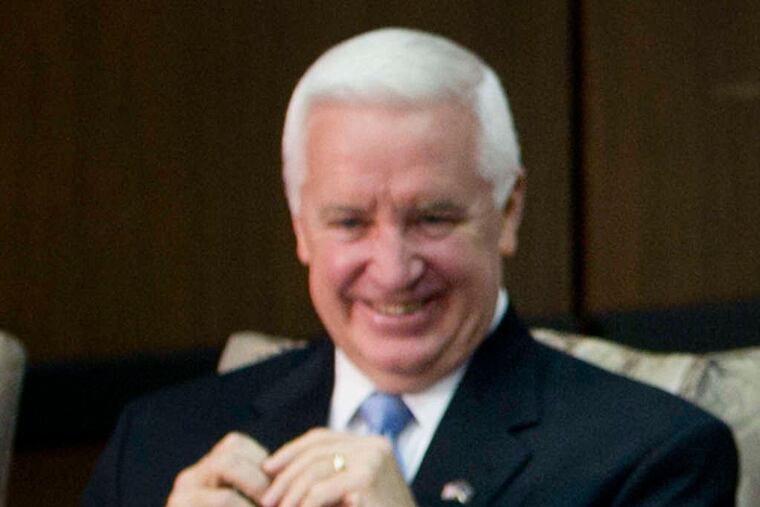Inquirer Editorial: Gov. Corbett gets centered
While gerrymandered districts fuel polarization ad absurdum in state legislatures and Congress, governors face the unavoidable judgment of all the voters within a set of immovable borders. Hence their salutary long-term bias toward the reasonable and functional.

While gerrymandered districts fuel polarization ad absurdum in state legislatures and Congress, governors face the unavoidable judgment of all the voters within a set of immovable borders. Hence their salutary long-term bias toward the reasonable and functional.
Gov. Corbett has become something of a case study in this phenomenon. The latest example is the Republican governor's decision to head off a federal reduction in food-stamp benefits for 400,000 Pennsylvania families. Only two other governors preceded Corbett in this maneuver, and both are Democrats governing blue states.
Corbett began his tenure as a conservative bent on slashing social spending, but now he has taken a series of welcome steps toward the sensible center. This one was precipitated by the farm bill passed by Congress last month, which targets 15 states dispensing nominal heating assistance to make some families eligible for added food aid. Under the new federal law, households must receive at least $20 a year in energy aid to be eligible for increased nutrition assistance. Corbett announced last week that he would use surplus energy assistance funds to meet that threshold, forestalling a reduction of $300 million in annual nutrition assistance.
While critics of these "heat and eat" programs accuse states of taking advantage of a federal loophole, Corbett's decision is one indication that some of the state's families need this help. Despite the fashion for attacking food stamps in some circles, they are a modest benefit supporting basic sustenance as well as the economy, particularly amid continued postrecession hardship.
Corbett's recognition of these realities is welcome. And in light of federal policies that are doing more than enough to prematurely roll back the nation's response to the downturn, the governor should also follow through on his promise to reconsider his administration's wrongheaded asset test for food aid.
Rescinding or at least revising that policy would be in keeping with the governor's other recent shifts toward pragmatism. He suggested last week, for example, that he would also reconsider a redundant work-search requirement in his proposed substitute for Medicaid expansion under the Affordable Care Act, which would benefit from that and a few other adjustments. His administration also lobbied successfully for a robust and responsible transportation funding bill to maintain the state's roads, bridges, and mass transit despite resistance from conservative Republicans in the state House.
Many critics and observers have accused the governor of a foxhole conversion on these matters, saying his poor polling and the approaching election have him scrambling for a new approach. There is probably some truth to that, even though food assistance isn't known for driving voters to the polls in droves. It's also likely that the governor is getting better advice lately, including from his reconstituted top staff and his capable current welfare secretary, Bev Mackereth.
But the most important factor here is the one that causes most governors (and presidents and mayors) to disappoint any ideological constituency: Corbett has a state to run. That he has learned as much behooves him and the commonwealth.